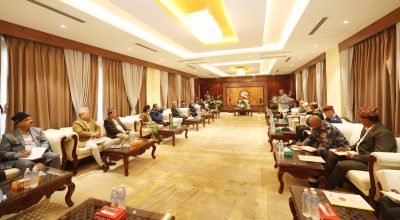
Bruce Ackerman
NEW HAVEN, JULY 2 (PS): Both Chief Justice John Roberts and Justice Sonia Sotomayor of the United States Supreme Court have just announced grand opinions trying to resolve the fundamental constitutional issues raised by former President Donald Trump’s claim to absolute immunity from criminal prosecution for his actions while in office. So far as the Roberts majority is concerned, the Constitution grants presidents a “presumptive immunity” for actions involving their “official conduct.”
If the Justice Department is to proceed with its prosecution of Trump for his efforts to overturn the November 2020 election, it must now overcome this presumption – even where Trump’s role in the January 6, 2021, storming of the US Capitol is concerned. In order to do so, prosecutors must follow an extraordinary procedure under which they must ultimately convince the Supreme Court that their evidence is so compelling that a jury trial might be appropriate.
According to Sotomayor, who wrote for the three dissenting justices, Roberts’ sweeping grant of immunity has “no firm grounding in constitutional text, history, or precedent.” Sotomayor’s 10,000-word dissent tries to establish that all three – text, history, and precedent – “point in the opposite direction. No matter how you look at it, the majority’s official-acts immunity is utterly indefensible.”
For what it’s worth, I think that Sotomayor is right and Roberts is wrong. Indeed, I have written an entire book, The Failure of the Founding Fathers, exploring the US founders’ struggle over executive privilege, and their determination to prevent the president from claiming the immunity from prosecution repeatedly asserted by the British monarchy.
But for now, it is much more important to consider the objection raised by Justice Amy Coney Barrett to both Roberts’ constitutional glorification of the presidency and Sotomayor’s devastating critique of Roberts’ majority opinion. So far as Barrett is concerned, it was a mistake to use the Trump case as an occasion for constructing a single legal formula that purports to resolve all the issues raised by presidential immunity, given the very different public-policymaking responsibilities of the executive branch in the twenty-first century.
Instead, she insists that it is far better to focus on the particular events of January 6 and consider whether they involve such an exceptional abuse of power that criminal prosecution seems necessary to vindicate the principle, affirmed by both sides, that the president does not possess the sweeping immunity of a traditional monarch.
In making her plea, Barrett called on her colleagues to hew to the traditional path of judicial restraint, whereby the justices eschew premature proclamations of larger principles and instead try to decide particular cases on their particular merits in a concrete fashion. Most of the liberals and conservatives on the Court have repeatedly embraced this problem-solving approach, especially when dealing with relatively novel issues – since, in these cases, they cannot rely on decades of judicial experience with similar dilemmas.
Barrett is right to ask why Roberts and Sotomayor did not join her in adopting the problem-solving approach that they have repeatedly endorsed in many other contexts. After all, the Trump case represents a presidential power-play of a kind that has not been attempted since the Reconstruction period following the US Civil War.
Roberts’ resistance to taking this familiar path is particularly puzzling. He has devoted his entire career to convincing Americans that the Court can take a thoughtful problem-solving approach to issues that otherwise would generate bitterly polarizing responses from Congress and the presidency. Over the course of his 19 years as Chief Justice, he has repeatedly convinced four of his colleagues to follow his lead and avoid transforming the Court into a political football.
It is perfectly plain that this path was open once again in the Trump immunity case. If Roberts had refused to join the extreme conservatives, and joined Barrett’s opinion, the three liberal justices would have signed on – since it would have led to a bipartisan majority of five justices condemning Trump’s activities on January 6 as a blatant abuse of presidential power. Instead, Roberts took the path that not only betrayed Founding principles, as Sotomayor argued, but also betrayed the very principles to which he has dedicated his entire career.
Worse yet, the Court’s decision will deprive the country of an important resource in dealing with the electoral crisis that could come this fall. After all, even if Trump loses the election in November, there is nothing to stop him from once again calling upon his supporters to invade the Capitol and assault Kamala Harris, rather than Mike Pence, and so prevent the vice president from certifying Joe Biden’s victory.
After all, what does Trump have to lose? The Roberts Court will be certain to prevent his prosecution, let alone allow a jury of 12 Americans to decide whether he deserves some prison time for his assault on our constitutional democracy.
Bruce Ackerman, Sterling Professor of Law and Political Science at Yale University, is the author of We the People, a three-volume work examining the turning-points in American constitutional history over the past 250 years.
Copyright: Project Syndicate, 2024.
www.project-syndicate.org












